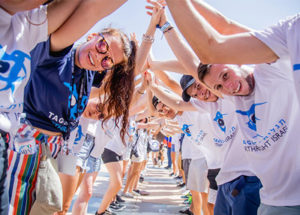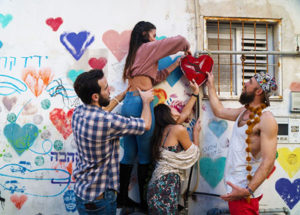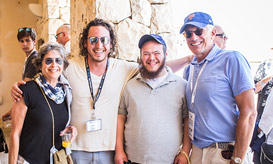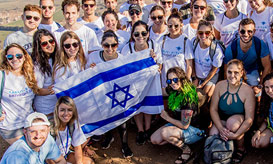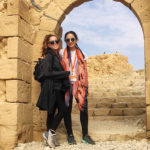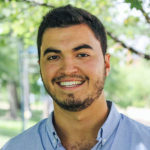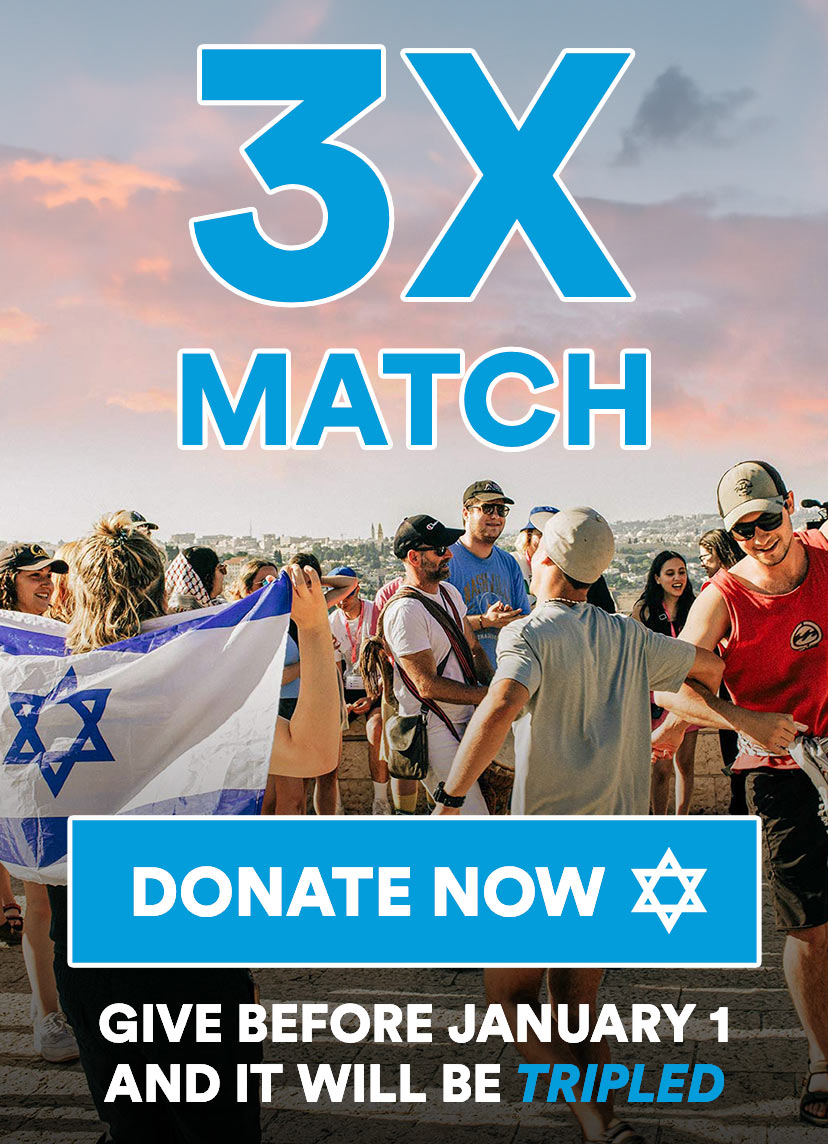Nearly every Birthright Israel participant tells us that the sunrise hike to the top of Masada…
Birthright Israel is an experience that strives to maximize every minute of those magical ten days. So it’s no surprise that 18 years ago, on my Birthright Israel trip, I woke up in a Bedouin tent cold, frustrated and exhausted. I staggered onto the bus and promptly fell asleep. Shortly thereafter, we had reached our destination, the base of the Roman ramp that led up to Masada. As I started to walk off the bus, I felt compelled to make it to the top of the mountain for sunrise. I ran up that ramp until I arrived at King Herod’s winter palace, eventually fortified by Jewish rebels who would give up their lives rather than live in slavery. At that moment, looking out over the Dead Sea towards the Jordanian hills, I felt a connection to my Jewish birthright, in a way that I had never felt before. I felt at home. It was as if, for the first time, I knew that G-d was present in my life.
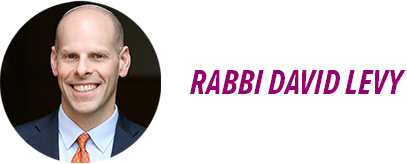
Birthright Israel changed me forever. In many ways, my trip was a crucial step in my becoming a Rabbi today. It was one of the first experiences I had where I was connecting to Israel, and Judaism as an emerging adult, and not through my parents.
It also had a huge impact on my Rabbinate. Birthright Israel was my first immersive travel experience: an opportunity to delve deep into a society, develop lifelong connections, and have crucial opportunities for introspective and extrospective learning. I believe strongly in the transformational impact of immersive travel experiences and have quadrupled the number that we offer in our congregation.
I’ve never forgotten the way in which Birthright Israel changed my life and perspective. It’s why every time I see a twenty-something in my congregation, the first question I ask them is “When are you going on Birthright?” I recognize the power Birthright Israel has to deepen their Jewish identity and connection to Israel and to seize their Jewish birthright.
Because Birthright Israel is far more than just a trip: it’s representative of our divine inheritance. In Parashat Toldot, we read about Jacob stealing the birthright, but in Parashat Vayishlach, we read about Jacob truly earning it, as the text teaches:
Genesis 32
כה. וַיִּוָּתֵר יַעֲקֹב לְבַדּוֹ וַיֵּאָבֵק אִישׁ עִמּוֹ עַד עֲלוֹת הַשָּׁחַר
25. And Jacob was left alone, and a man wrestled with him until the break of dawn.
כו. וַיַּרְא כִּי לֹא יָכֹל לוֹ וַיִּגַּע בְּכַף יְרֵכוֹ וַתֵּקַע כַּף יֶרֶךְ יַעֲקֹב בְּהֵאָבְקוֹ עִמּוֹ
26. When he saw that he could not prevail against him, he touched the socket of his hip, and the socket of Jacob’s hip became dislocated as he wrestled with him. :
כז. וַיֹּאמֶר שַׁלְּחֵנִי כִּי עָלָה הַשָּׁחַר וַיֹּאמֶר לֹא אֲשַׁלֵּחֲךָ כִּי אִם בֵּרַכְתָּנִי
27. And he (the angel) said, “Let me go, for dawn is breaking,” but he (Jacob) said, “I will not let you go unless you have blessed me.”
כח. וַיֹּאמֶר אֵלָיו מַה שְּׁמֶךָ וַיֹּאמֶר יַעֲקֹב
28. So he said to him, “What is your name?” and he said, “Jacob.”
כט. וַיֹּאמֶר לֹא יַעֲקֹב יֵאָמֵר עוֹד שִׁמְךָ כִּי אִם יִשְׂרָאֵל כִּי שָׂרִיתָ עִם אֱלֹהִים וְעִם אֲנָשִׁים וַתּוּכָל
29. And he said, “Your name shall no longer be called Jacob, but Israel, because you have struggled with Divine and with men, and you have prevailed.”
Jacob’s birthright is actualized through a change in name. No longer will he be solely defined by his birth name, but rather by the name that becomes our name: Yisrael: one who struggles with G-d.
Our Jewish tradition, from our very name, demands struggle. We study Jewish text not by simply sitting there reading, rather we argue, we struggle with ideas, with people and places. It is the back and forth that helps us define who we are as Jews, and what it means to be a human being.
We, unfortunately, live in a society that strives to simplify every conversation into a soundbite. Where Israel is either David or Goliath, either the oppressor or the oppressed. To struggle with something, to see nuance, to see shades of gray is counter-cultural in America today. Our society strives for certainty when we all live in ambiguity.
Birthright Israel offers young people the chance to struggle with the Jewish state. To understand the complexity by traveling with real Israeli soldiers who have the chance to share their story, not a soundbite. To develop an authentic love for the country through that struggle. Not an infatuation with an imaginary place, but through interactions and conversations with real Israelis. These conversations develop an understanding of our complex, beautiful state. May we all have the strength to embrace our birthrights and welcome the struggle and love into our lives.
Rabbi Levy lives with his wife and three sons in Westchester County, NY. He has served as the Associate Rabbi & Jewish Learning Lab Director at Westchester Reform Temple for the past 7 years.

